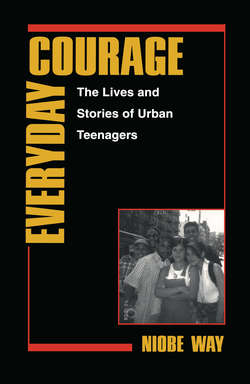Читать книгу Everyday Courage - Niobe Way - Страница 11
На сайте Литреса книга снята с продажи.
Objectivity?
ОглавлениеCriticizing the objective ideal in the social sciences, Rabinow and Sullivan write:
There is no outside, detached standpoint from which to gather and present brute data. When we try to understand the cultural world, we are dealing with interpretations, and interpretations of interpretations. Culture—the shared meanings, practices, and symbols that constitute the human world—does not present itself neutrally or with one voice, it is always multi-vocal … and both the observer and the observed are always enmeshed in it. … There is no privileged position, no absolute perspective, no final recounting.2
Like all other researchers, I came into my research on urban teens with a set of expectations and beliefs—a history, a gender, a race, a language, and a culture—that influenced how I understood and interpreted their stories. My stance as a researcher could not have been objective because I was not able to withdraw from my own perspective. In contrast to the beliefs characteristic of a more positivistic scientific tradition, the beliefs maintained within the interpretive turn assert that reality is not fixed and cannot be observed uninfluenced by the observer.3
Beginning with Schleiermacher in the early nineteenth century, various philosophers and psychologists have put forth theories making reference to a “hermeneutic circle.” This “hermeneutic circle” centers on the idea that “understanding inevitably involves reference to that which is already known.”4 My study rests on the assumption, for better or worse, that we can never escape such a circle of interpretation. When we try to understand a new phenomenon, we are always coming into it with expectations and preconceptions. Furthermore, what we already know, or our pre-understanding, is itself not an unmediated knowledge of the empirical world but determined by the traditions and symbolic codes within which we live and which shape our lives and ways of making sense of it. Once this dialectical nature of understanding has been recognized, the illusion of a completely detached stance as a researcher is exposed as such. The belief in an absolutely blank mind—a mind without any biases, prejudices, or pre-understandings—is a powerful trope or figure for scientific research but an untenable research tool.
One outcome of this questioning of objectivity is that generalizations and universals that surpass the boundaries of culture, time, and region become suspect. As the feminist psychologists Carol Gilligan, Lyn Mikel Brown, and Annie Rogers have pointed out: “How can sex [or class, race, or culture] be a difference that makes no difference?”5 Experience, perception, or ways of speaking cannot be decontextualized, taken out of culture, time, and place. To discuss how a person speaks about her or his world means to take into account and understand that these experiences are intimately connected to her or his specific location in the world.
One of the problems in the existing research literature on various populations of adolescents is that researchers frequently infer or explicitly state that what they have discovered from their data is the “objective truth” and that their findings can, therefore, be generalized to larger populations. The implicit and explicit denials by researchers of their lenses and biases often lead to distorted and misguided conclusions about the researched population. A striking example of such problematic conclusions is the “deficit model” of development used by many social scientists, which assumes deficiency or pathology when a particular population is different from what is typically a middle-class norm.6 For example, ethnic-minority parents are often blamed for not instilling in their children the “right” (i.e., white, middle-class) educational values.7 This deficit belief system, however, is rarely made explicit in the actual description of the research, and consequently the findings appear “objective.” Employing this stance of objectivity, social science researchers have been able to maintain that urban populations are deficient or pathological because these populations appear deficient or pathological according to these unacknowledged biases. The alternative hypothesis has only recently begun to be explored—namely, that researchers have obtained certain results because they have worked within a deficit framework rather than within a culturally specific normative framework.
